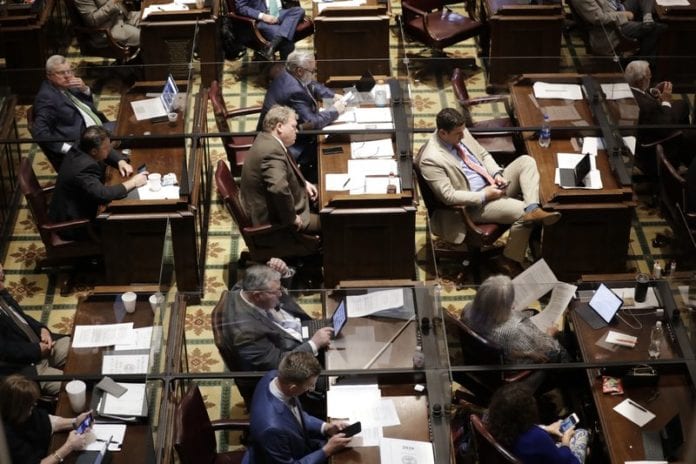by Kimberlee Kruesi —
NASHVILLE, Tenn. (AP) — Amid nationwide unrest and a global pandemic that wrecked the state budget, Tennessee lawmakers advanced one of the strictest abortion bans in the country as most Tennesseans were asleep Friday and largely unaware the GOP-dominant General Assembly had taken up the controversial proposal.
The bill’s passage shocked Democratic lawmakers and reproductive rights advocates who had been assured for weeks that the anti-abortion measure would not be considered in the Senate.
Just hours after lawmakers adjourned Friday, an emergency lawsuit had already been filed seeking to block the implementation of the measure.
Planned Parenthood, the American Civil Liberties Union and the Center for Reproductive Rights — the plaintiffs in the case — declared that Tennessee was the first state to pass an abortion ban since the coronavirus outbreak hit the United States.
Gov. Bill Lee is expected to sign the bill “in the coming days,” according to his office.
Republicans were able to squeeze the anti-abortion measure through as last-minute negotiations stalled between the House and Senate on Thursday. Senate leaders had initially promised earlier this month only to consider coronavirus- or budget-related proposals, but eventually conceded to consider a handful of others in order to finalize a new spending plan for fiscal year 2020-21.
“People are going to wake up tomorrow and we will have passed a bill that we said we weren’t going to take up,” Democratic Sen. Jeff Yarbro of Nashville had argued in opposition early Friday.
Under the bill, abortions would be banned once a fetal heartbeat is detected — about six weeks into pregnancy, before many women know they’re pregnant. Similar legislation has been enacted in other states, such as Mississippi and Georgia, but has been blocked by legal challenges.
Those court cases are expected to take years to snake their way through the legal system.
Supporters of the bills want to bring these types of lawsuits to an increasingly conservative U.S. Supreme Court in hopes of ending the constitutional right to abortion protected under the 1973 Roe v. Wade landmark ruling.
Also tucked in Tennessee’s 38-page bill is a requirement that women seeking an abortion undergo an ultrasound and have the doctor describe and display the image to her.
Additionally, doctors must inform women that drug-induced abortions may be halted halfway. Medical groups say the claim isn’t backed up by science and there is little information about the reversal procedure’s safety.
Democratic Rep. Gloria Johnson of Knoxville said that women’s reproductive rights were being used “like a bargaining chip” to get the budget passed.
Lee, a Republican, had encouraged the Senate to take up his proposal while talking to reporters earlier Thursday.
“I believe that life is precious. Every human being is created in the image of God and protecting those lives is important to me. This legislation is an effort to do that,” he said.
Meanwhile, bleary-eyed after spending hours hashing out spending plan details, lawmakers eventually passed a $39.4 billion budget for fiscal year 2020-21.
A key win for the Senate was the elimination of the state’s Hall income tax on stocks and bonds.
The Tennessee Legislature began phasing out the state’s Hall tax in 2016, with its total elimination beginning Jan. 1, 2021. The current Hall tax rate is 1% on dividends from stock.
State lawmakers made sure to funnel $210 million to the state’s cities and counties to help with COVID-19 related budget deficits. There are no restrictions on how the money can be spent.
Lawmakers entered their election-year legislative session in January, only to leave town in March for months because of the coronavirus pandemic. They returned to work about three weeks ago.
After George Floyd’s death at the hands of Minneapolis police sparked nationwide protests and unrest, Tennessee Republicans stirred more outrage locally by spiking a resolution this week for Ashanti Nikole Posey, a Black teen shot and killed this year. Police officers had said the 17-year-old was killed after she and a friend made a “small marijuana sale,” though the sale has never been proven.
Republican House Majority Leader William Lamberth helped block the joint resolution after he told the chamber he could not support the legislation due to the circumstances surrounding Posey’s death.
However, by Thursday night, Senate members passed their own version honoring Posey that did not require approval from the House.
During the final moments of session, the two chambers were unable to pass legislation that would have provided broad protections for businesses, schools and nursing homes against COVID-19-related lawsuits.
Lee’s office has said the governor is considering calling the General Assembly back to the Capitol for a special session to address legislation that failed to pass. Lawmakers were under the presumption they wouldn’t meet again until January.




